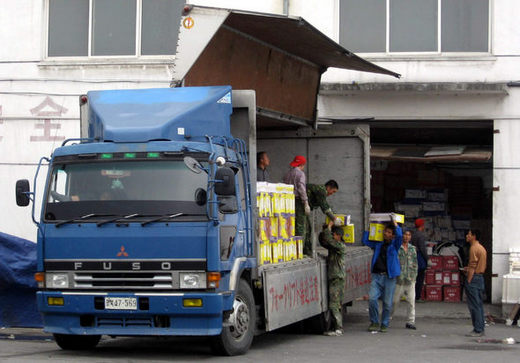 |
|
Chinese workers load freight onto a truck bearing North Korean license plates in the border city of Dandong, China on October 16.
|
China clamping down on trade with N.K. after U.N. resolution
October 17 marked the 80th anniversary of the establishment of the ‘Down-with-Imperialism Union (DIU),’ one of North Korea’s most important holidays. North Korea claims its founder, Kim Il-sung, formed the organization at the age of 14 in order to spread an anti-imperialist movement against Korea’s Japanese colonizers. On this day, at a middle school on the North Korean side of the Apnok (Yalu) River, which runs between the North and China, a sports event was held to coincide with the anniversary. The mood of the participants was bright: women were clad in traditional Korean clothing and students were busy dancing or running around. A thorough inspection While North Koreans took a three-day holiday because of the anniversary, customs officials and businessmen dealing with North Korea-China cross-border logistics were occupied as usual. While the residents on either side of the Apnok enjoyed the sunny autumn weather, those doing business between the two nations felt tension.Asked about what things have changed in sending goods to North Korea, a Chinese businessperson trading with the North, who is only identified by the surname Ryu, said, "[Relations between] the two nations have been recently strained. Recently, customs inspections have became very strict." In order to get approval from the customs office in Dandong to send goods to North Korea, Ryu said that one has to disclose very specific information about the goods, such as their price or their methods of packaging. "Small items are being inspected more thoroughly. But if you do not explicitly reveal what items are, you can not send them to North Korea," Ryu said. Asked about any potential problems in sending earrings, pearls, or watches, Ryu said, "You should clarify the price and specifications of the goods. If they are judged to be luxury goods, they won’t be sent to North Korea." Asked whether the stringent measures stemmed from the October 14 U.N. Security Council resolution against North Korea following its nuclear test, Ryu said, "I’ve heard that’s right." Ryu’s remarks indicate that Beijing has taken relatively strict measures against its ally Pyongyang in order to enforce the U.N. resolution. Cargo trucks stopped Asked about how the customs procedures have become tighter, an official at the Dandong customs office declined to comment by telephone, citing no authority to speak to the media. However, a person doing business with North Korea said, "Recently, customs inspection procedures have became stringent. This has reduced trading volume with North Korea, due to the longer time needed for customs inspection." In an apparent confirmation of the businessperson’s remarks, a long line of cargo trucks heading to North Korea was seen at a Apnok River bridge on the evening of October 16, the first working day after the U.N. resolution was approved. "At the Dandong customs office, officials conduct an inspection by randomly sampling 10 percent to 20 percent of goods to compare with their specifications," the businessperson said. "Previously, customs officials usually searched less than 10 percent of goods. Recently, the inspection became more stringent and thorough." North Korean bank "on vacation" The Dandong branch of North Korea’s Kwangseon Bank, which specializes in foreign currency transactions between North Korea and China, has been closed for a number of days. It is uncertain when the branch will reopen. Asked whether cash remittances to North Korea are possible via Kwangseon Bank, Choi Cheol-hong, head of the bank’s Dandong Branch, only replied, "We are on vacation, which will last through tomorrow and the day after tomorrow, and we don’t know when it will resume work," Choi said, without elaborating as to why the branch was on an indefinite vacation. Headquartered in Pyongyang, Kwangseon Bank has been a channel for cash remittances from people doing business with North Korea when they send money to Pyongyang via the Bank of China, the China Transportation Bank, and the China Construction Bank. In addition, officials at the Dandong branches of the Bank of China and the China Transportation Bank said cash remittances to North Korea are impossible for now, declining to give a reason.






